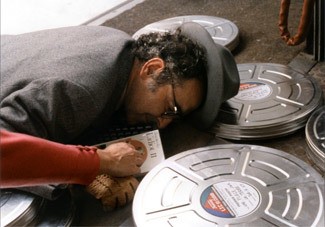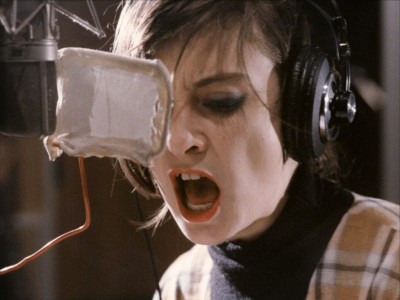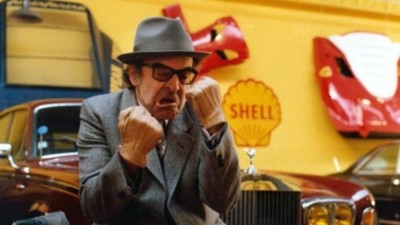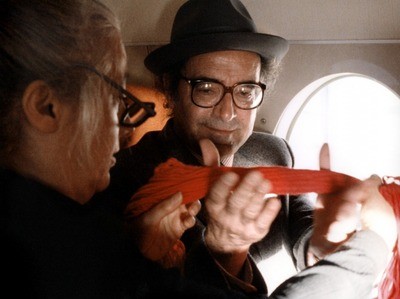| Reviews & Columns |
|
Reviews DVD TV on DVD Blu-ray 4K UHD International DVDs In Theaters Reviews by Studio Video Games Features Collector Series DVDs Easter Egg Database Interviews DVD Talk Radio Feature Articles Columns Anime Talk DVD Savant Horror DVDs The M.O.D. Squad Art House HD Talk Silent DVD
|
DVD Talk Forum |
|
|
| Resources |
|
DVD Price Search Customer Service #'s RCE Info Links |
|
Columns
|
|
|
Keep your Right Up (Soigne ta droite)

Please Note: The images used here are taken from promotional and other materials and do not directly reflect the picture quality of the current Blu-ray edition under review.
There's rarely been a great mind at work, in any art form, as voracious and restless as that of the legendary French filmmaker Jean-Luc Godard, who, as Susan Sontag once noted, "offend[s] veteran admirers in numbers almost equal to the new ones he acquires." Once the celebrated, highly influential ringleader whose Breathless really set off the international clamor over the "New Wave" of French cinema in the 1960s, Godard subsequently became an iconoclast's iconoclast, a filmmaker in a state of perpetual evolution, exiling himself from the movie industry in the late '60s and making decades' worth of dense, complex celluloid missives that have undeservedly (particularly in the case of his midcareer masterwork Histoire(s) du Cinéma) gone sparsely distributed and much less widely seen and acclaimed than his earlier films. It's from a midpoint in this post-New-Wave, exiled into unwarranted obscurity, yet still highly prolific period that Olive Films, as part of their laudable campaign to re-release Godard's relatively "lost" work, has rescued for their new Blu-ray edition his bracing, challenging 1987 feature Keep your Right Up (Soigne ta droite), which finds Godard, once an enfant terrible, in drolly self-deprecating middle-aged mode, crediting himself as "M. Godard" and allowing a certain cool, autumnal maturity (a new streak that ribbons ever more widely through of his '80s work), in the form of an elegiac contemplativeness, to break through the storm clouds of political commitment/despair from which had issued the downpour of his (sometimes anonymous, always highly politicized) output since Weekend (1967). It's a halfway mark between fierce youth and ruminating (though no less attentive and engaged) old age, between the apocalyptic Weekend's and 2010's great essay-poem Film Socialisme that makes for one dynamic milestone on Godard's singularly fascinating creative and temperamental journey.

If I've failed thus far to mention story or plot, it's because if there's one thing Keep your Right Up is decidedly not about, it's any kind of story in the conventional sense (characters, individual emotions, psychology, motivation, resolution, etc.). From the beginning, many found Godard's pictures cold, bewildering, and willfully pretentious/inscrutable in their preference for mining and riffing on the ideas and implications (philosophical, political, aesthetic, or other) of their stories; by the time of Keep your Right Up, any analogue to the dramatic/storytelling intent of novels or plays is long gone, replaced entirely with the hybrid of essay and poem toward which Godard had been striving for so long, and which he has continued to perfect in his later films. Here, then, the "story" is a pretext for fragmentation; sketching; and recurrent, anti-realistic/excessive images and sounds that elicit our emotional and intellectual engagement through the profundity (indeed, at times, the agony) of Godard's insatiable philosophical/metaphysical seeking and questioning. The director himself plays a figure called "the Idiot" by the running voice-over commentary (also in his voice, as usual); this is the affable, pratfall-prone, trenchcoat-and-hat-uniformed figure of physical comedy who, as the film begins, is beckoned from his cozily obscure rural dotage by a violently ringing telephone: It's a film producer who wants the Idiot to make a film on the double, immediately, like in time to be showing in cinemas by that very evening. The idiot obliges, taking the assigned car to the assigned airport terminal, a paperback of his namesake novel by Dostoyevsky and some canisters of film in hand, and eventually sells the film, while dazed from yet another spill, to a gauche banker whose representative is mesmerized by the shiny reflectiveness of those round aluminum tins.

Alongside the Idiot, whom the stereotypically cerebral and unsmiling Godard embodies with surprising flair and alacrity (the slapstick that results is clearly Godard's tribute to idols like Chaplin, Keaton, Jerry Lewis, and Jacques Tati -- to whose debut star turn in a 1936 René Clair-directed short, Soigne ton gauche (Keep your Left Up), his title is a reference -- and renders Keep your Right Up, in part, the most actually laugh-out-loud funny movie Godard has ever made), there's the Man (François Périer), the imperious but dull-minded banking magnate who buys the Idiot's film; the Average Frenchman (Jean Grécault) whose stabs at deep talk remain forever, pathetically half-baked and dangling incomplete; and the Individual (Jacques Villeret), a working-class yob whose tastes run to Mickey Mouse comics and who's abused by everyone whose path he crosses in the film -- from the man to the shrilly laughing bourgeois couple who employ him as their caddy to the stern leftist policeman who arrests, chains, and castigates him on their train trip to some barbed-wire-bounded death or limto to which he will now be consigned -- but who nevertheless proves to have the most genuine curiosity and observational feeling of all the figures that populate the film.

These figures are not characters but archetypes, human signifiers of philosophical or ethical categories, whose misadventures, however funny or awful, can only be viewed as parables (one of the film's funniest moments comes when Jane Birkin, in a cameo as the female half of a yuppie couple in a sleek sports car who ask the Individual the way to Paris, addresses this rotund laborer as the hard-working Ant from La Fontaine's fable, and the Individual, patronized by Birkin's "grasshopper," ends their exchange by pronouncing La Fontaine an asshole). They're figures caught on what becomes, as the film goes on (and justifying the pugilistic tone of its title beyond the Tati reference), a tumultuous cosmic battlefield where everything someone like Godard considers beautiful -- Nature, Art, Love -- appears doomed to defeat (this was the '80s, after all, a time anyone of remotely Godard's worldview would've experienced as politically, socioeconomically, and culturally opposed to true beauty). What Godard interweaves as the thematic glue to his parable about the battle between creativity, love, and life on one hand and hostile greed, status quo-mongering, and death on the other is gorgeously-shot footage of the acclaimed French alternative-rock band Les Rita Mitsouko as they arrange and rehearse their sophomore album in a sound studio. These recurring, lengthy interludes do overlap in some ways with the other fragments featuring the Idiot, the Man, and the Individual, etc. (aurally, it spills over, suddenly and to arrestingly disjunctive effect, into the other parts of the film, while the two lead band members meet up with the Man who's going to buy this film in which they're featured), but they primarily serve as the counter-example of the innate beauty of creation, any creation, in contrast to the anomie, despair, or outright destructiveness that the airplane trip taken by the Idiot (his fellow passengers comprise a gallery of mostly fools, sad sacks, and obnoxious scions of entitlement) and the persecuted life of the Individual.

What takes shape through all of this in Keep your Right Up, despite its slapstick and initial apparent randomness, is nothing less than a cosmology in which Godard situates the transcendence of free, spontaneous creation (the Les Rita Mitsouko musician and singer working on their songs) as heaven, the compromise and aggravation that the Idiot and the Individual suffer here on our earthly plane as a kind of purgatory, and the world of conspicuous consumption and aggressive mindlessness as hell (the same Divine Comedy hierarchy of Dante, presented here in a more vacillating/alternating than ordered fashion, that Godard would employ more explicitly and rigorously in his greatest postmillennial film, 2004's Notre Musique). Intertitles frequently appear between scenes to mark off "a place on earth" from "a place like in heaven," and we are shown again and again a particular, still-framed visual motif, made in collaboration with Godard's brilliant cinematographer Caroline Champetier (who would later do such magnificent work on Of Gods and Men and Holy Motors and whose work here, under Godard's direction, make for some of the most exquisitely, sensuously lit, composed, framed, and shot pictures to ever move, whether they're delineating the tremulous green on delicate-leaved branches blowing in the breeze or the primary Pop-Art reds and yellows of automobiles in a mechanic's garage), displaying a partly-ajar window whose open space removes the barrier between an interior and a spectacular sunset and its resultant deep-pink dusk sky outside. These images, especially in context, are so powerful and sublime that you'll still see them if you close your eyes, and their wordless meaning is both solemn and celebratory: The exponents of ugly, enforced practicality and expediency can't barricade every opening or seal us off from beauty entirely, and through its tortuous philosophical-metaphysical journey toward and ultimate embrace and vindication of the idea of beauty as inherently valuable, a film like Keep your Right Up slips elegantly and exhilaratingly through the windows that will always sometimes come incidentally ajar, like the glorious, shimmering pink of a celestial dusk penetrating and illuminating the shadows of our darkened, cloistered rooms. In more senses of the word than would usually apply in a post-religious era, Keep your right Up is a heavenly work of art.

Video:
Olive continues its respectful treatment of Godard's "lost" work with this transfer, which presents the film at an aspect ratio of 1.33:1 (close enough to its original aspect ratio of 1.37:1, the difference being that no soundtrack-strip is required for Blu-ray viewing and we therefore get a tiny bit more of the frame than cinema-goers did) and has a picture quality that retains a healthy celluloid-like appearance (no overuse of digital noise reduction (DNR)) and a wonderful naturalness of skin tones and solidity/vividness of color and light, with no crushing, muting, or flickering to the image at any point. No compression artifacts such as aliasing or edge enhancement/haloing are to be discerned, either;
Sound:The disc's DTS-HD Master Audio 1.0 soundtrack (in the original French with non-optional English subtitles) is ample and conscientiously made enough to easily accommodate all of the many different, exquisitely recorded and mixed dimensions (as usual for Godard, working here with Marc-Antoine Beldent, Bernard Leroux, and François Musy) in the film's sound design. Everything is clear, rich, immediately present-sounding and multidimensional, with no imbalance, distortion, or other audio flaws whatsoever.
Extras:Technically speaking, none; however, if you continue watching the film after its final cut to black, its theatrical trailer then plays as part of the final chapter of the disc, which is confusing and seems a misstep on the part of those who programmed the disc (only by searching on YouTube could I confirm that the bit that comes up after a stretch of black silence that seems to indicate that the film has ended really is the promotional trailer that it appears to be, and not some self-reflexive addendum to the film itself).

A pivotal work in which the great French director Jean-Luc Godard's vision begins to vacillate between angry political embitterment and elegiac, metaphysical-philosophical contemplation, Keep Your Right Up (Soigne ta droite) is a daring hybrid that manages to bring together and very fruitfully juxtapose the funniest (Godard himself appears as a slapstick figure, a hapless and oblivious idiot savant right out of Jacques Tati or classic silent comedy) and most profoundly, seriously stirring of the filmmaker's impulses. On the pretext of a fanciful, quasi-satirical parable about a filmmaker called upon by a producer's ridiculous whim to have a movie in the can and ready for distribution by the very night of the request, it becomes a veritable delineation of an entire Godardian cosmology that ranges unbelievably far and wide, pulling in contemporary art-rock music, copious literary and historical references/quotations, and some of the most sensuously sublime imagery you've ever seen on film to ravish our eyes, ears, and minds with an indelible vision of a universe where the power of light (beauty, reflectiveness, creation) seems about to be eclipsed by that of darkness (cynical philistinism, greed, heedless aggression and destructiveness), but shows itself in the end to be more resilient, more eternal than anything. As usual when it comes to Godard, anyone looking for straightforward storytelling and its accompanying standards of merit and satisfaction, this film is guaranteed to frustrate or even enrage at every turn. However, for those who can handle 80 minutes of film that fluently and incisively uses, in cinematic terms, the strategies of dialectical philosophy, the Nietzchean-allegorical essay, and the indirect yet momentous allusiveness of poetry, Keep Your Right Up will be mind-blowing and expansive to the point of dizzy, head-spinning bedazzlement; it's epic in a way that makes most films so characterized look like the most trivial child's play. Highly Recommended.
|
| Popular Reviews |
| Sponsored Links |
|
|
| Sponsored Links |
|
|
| Release List | Reviews | Shop | Newsletter | Forum | DVD Giveaways | Blu-Ray | Advertise |
|
Copyright 2024 DVDTalk.com All Rights Reserved. Legal Info, Privacy Policy, Terms of Use,
Manage Preferences,
Your Privacy Choices | |||||||














